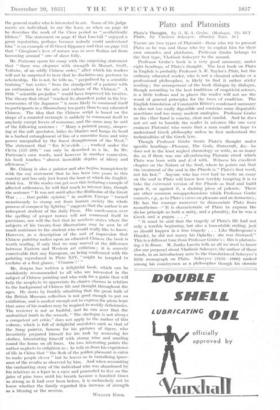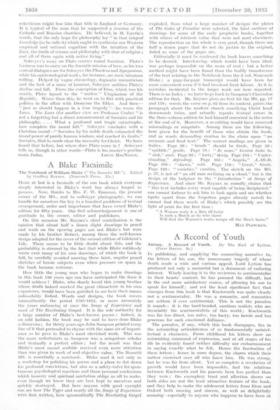Plato and Platonists
THERE are two types of Platonist—those who try to present Plato as he was and those who try to exploit him for their own crusades and platforms. Professor Grube belongs to the first type, Vladimir Solovycv to the second.
Professor Grube's book is a very good summary, under eight headings, of Plato's thought. The best book on Plato in English is probably Professor A. E. Taylor's Plato, but the ordinary educated reader, who is not a classical scholar or a* professional philosopher, is likely to find it rather sticky reading ; the arrangement of the book dialogue by dialogue,. though according to the best traditions of empiricist scienees is a little tedious and in places • the reader will not see the wood of general principles for the trees of erudition. The English translation of Constantin Ritter's condensed summary is also not too easily digestible and contains some disputable assertions and too many modern analogies. Professor Grube• on the alter hand is concise, clear and candid. And he does not set out to humble the reader in advance like one very eminent Platonist who wrote that a man could not hope to understand Greek philosophy unless he first understood the technicalities of the Greek lyre.
Though Professor Grube treats Plato's thought under specific headings—Pleasure, The Gods, Statecraft, &c.—he does not in the least neglect-chronology or write, as so many do, as if there was one all-embracing Platonic creed which Plato was born with and d:sd with. Witness his excellent chapter on the Nature of the Soul, where lie points out that the treatment of the soul in the Phaedo is " Plato's first word, not his last." Anyone who has ever had to. write an essay on the soul in Plato will know how terribly teMpting it is to take the extremist version of the Phaedo 'as final and build upon it, or against it, a dashing piece of polemic.' There are other common misapprehensions which Professor Grube corrects, e.g., as to Plato's views on pleasure and, oil democracy. He has the courage moreover- to disassociate • Plato from monotheism—" It is characteristic of Plato to express the divine principle as both a unity, and 'a plurality, for he was a Greek and a pagan. . . ."
" It must be said that tire tragedy of Plato's life had not only a terrible beginning, but also a lamentable ending, just' as should happen in 'a true tragedy . . . Like Shakespeare's Hamlet, lie did not Marry hiS Ophelia ; she was drowned." This is a different tone from Professor Grube's ; this is platonis- ing cl la Busse. M. Janko Lavrin tells us all we need to know (for our purpose) about Vladimir Solovyev, the author of these words, in an introductory note to the translation of Solovyev's little Monograph on Plato. Solovyev (1853-1900) ranked• alnong his countrymen as a philosopher though his chronic eclecticism might lose him that title in England or Germany. It is typical of the man that he supported a reunion of the Catholic and Russian churches. He believed, in M. Lavrin's words, that the only hope for philosophy lay " in that integral knowledge (as he calls it) which ought to synthesise our Western empirical and rational cognition with the intuition of the East, the truth of science and philosophy with that of religion ; and all of them again with active living."
Sulovycv's essay on Plato centres round Socrates. Plato's business was to carry on the Socratic mission of love, so his two cent ral dialogues arc for Solovye v the Phaedrus and 'Symposium, while his epistemological work;, for instance, are mere inhuman trifling. Helped by vague chronology, dogmatic romanticism and the lack of a sense of humour, Solovyev outlines- Plato's decline and fall. From the conception of Eros, which was his zenith, Plato lapsed to the " useless " Utopianism of the Republic. Worse than this, he went on to flirt with practical politics in the affair with Dionysus the Elder. And then- " just as should happen in a true tragedy "—he wrote the Laws. The Laws (fur another view see Professor Grebe) " is not a forgetting but a direct renouncement of Socrates and his philosophy. . . . What a profound and tragic catastrophe, bow complete the moral fall." Solovyev concludes with a Christian moral—" Socrates by his noble death exhausted the moral power of purely human wisdom, and reached its limits." Socrates, that is, made clear the necessity for Christ. We have heard that before, but where does Plato come in ? Solovyev tells us, though in other words—Plato is his master's posthu-











































 Previous page
Previous page